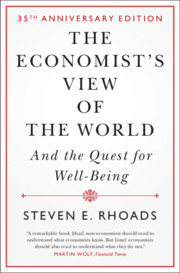Book contents
- More Praise for The Economist’s View of the World
- The Economist’s View of the World
- The Economist’s View of the World
- Copyright page
- Dedication
- Contents
- Preface
- Acknowledgments to the First Edition
- Acknowledgments
- Introduction
- Part I Useful Concepts
- Part II Government and Markets, Efficiency and Equity
- Part III The Limits of Economics
- 7 The Economist’s Consumer and Individual Well-Being
- 8 Representatives, Deliberation, and Political Leadership
- 9 Conclusion
- Notes
- Index
8 - Representatives, Deliberation, and Political Leadership
from Part III - The Limits of Economics
Published online by Cambridge University Press: 24 September 2021
- More Praise for The Economist’s View of the World
- The Economist’s View of the World
- The Economist’s View of the World
- Copyright page
- Dedication
- Contents
- Preface
- Acknowledgments to the First Edition
- Acknowledgments
- Introduction
- Part I Useful Concepts
- Part II Government and Markets, Efficiency and Equity
- Part III The Limits of Economics
- 7 The Economist’s Consumer and Individual Well-Being
- 8 Representatives, Deliberation, and Political Leadership
- 9 Conclusion
- Notes
- Index
Summary
When doing policy analysis, economists assume that a good policy is a consumer-preferred policy. When economists think about the policy process or political institutions, their normative standard is the same. The good representative is a clerk-like aggregator of consumers’ preferences. This normative standard leads many economists to be supportive of direct democracy, such as initiatives and referenda.
The founders viewed direct democracy with great alarm, because their study of history showed that the political ignorance and strong passions of the people frequently brought down democratic regimes. They favored a representative democracy, because it tended to refine and enlarge the public’s views through a deliberative process. Initiatives and referenda lead to “We win, you lose” decisions. Representative institutions are more likely to reach conclusions that reflect some minority points of view, and such compromises are more likely to be enforceable.
By encouraging deliberation, our large republic’s legislative process also encourages the selection of representatives with temperaments predisposed to consider the needs of others and the “permanent and aggregate interests of the Community.” Although the sharp splits in our nation and thus in our political institutions make deliberation less likely, the splits also make it more necessary. In Congress there are many recent examples of a deliberative process at work.
- Type
- Chapter
- Information
- The Economist's View of the WorldAnd the Quest for Well-Being, pp. 221 - 241Publisher: Cambridge University PressPrint publication year: 2021

